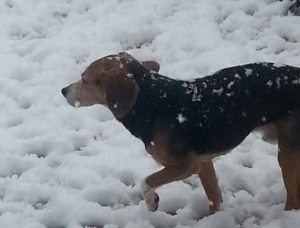 With winter poised to strike this weekend, we started thinking about all of the things that could pose a risk to your furry family members. Just like the summer heat, the winter cold presents its own challenges for your pets and their safety both inside and outside the house. Some of them might be obvious (anti-freeze) while others may be a bit surprising (frostbite?). But all of them are important to know as we head into the harsh winter season.
With winter poised to strike this weekend, we started thinking about all of the things that could pose a risk to your furry family members. Just like the summer heat, the winter cold presents its own challenges for your pets and their safety both inside and outside the house. Some of them might be obvious (anti-freeze) while others may be a bit surprising (frostbite?). But all of them are important to know as we head into the harsh winter season.
Our pets have nice, warm fur coats, right? So why should we worry about them outside in the cold? Just like us, they have become accustomed to the warmth of our climate-controlled homes. Thin or short haired dogs (greyhounds, whippets, boxers, etc.) are more susceptible to the dipping temperatures as are pets with certain medical conditions (skin problems, hypothyroidism, etc.). That’s why when you’re looking at the outside temperature, it’s important to also factor in the wind chill. It can take a cold day to a bitterly cold one very quickly! Pet Health Network advises using a winter jacket on susceptible dogs when temps drop below 20-degrees.
In addition to the cold, ice melt (or salt) can irritate your pet’s paws and cause stomach upset if ingested. Be sure to look for pet-friendly brands at the store. If your pet stays outside part time or full time, make sure he/she has a nice, warm shelter and that his water supply is not frozen. Because cats are known to seek shelter near your car’s warm engine, be sure to knock on your hood before starting your car this time of year. Space heaters may seem like a good solution, but they can cause fires, carbon monoxide poisoning and injury to your pet. Keep your pet away from any frozen bodies of water since they can fall through and require rescue.
One of the more surprising threats may be frostbite. We’ve all heard about “Jack Frost nipping at your nose”, but what about your pet’s? Extended time outside in the cold can lead to frostbite (especially in areas such as the tip of the tail, ears, etc.), so it’s important to know the signs: redness, cold to the touch, swelling and eventual loss of tissue. If you suspect that your pet has developed frostbite, bring him/her into a warm shelter immediately. Apply lukewarm heat (as rapid, aggressive heating can cause more damage with the melting ice crystals) and give us a call at 301-258-0333. Keeping these safety tips in mind, you and your pets can enjoy the beautiful winter season together.